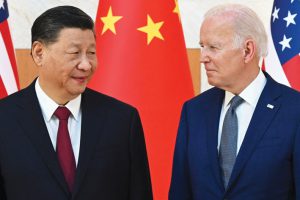BLOOMBERG
Back in November, before the latest downward spiral in US-China ties, Xi Jinping cast himself as a statesman in a meeting with Joe Biden.
Saying both nations need “a responsibility for history,†Xi appeared to play ball with US calls to “compete vigorously†with China while establishing “guardrails†to avoid conflict. After speaking with Biden for more than three hours in Indonesia, Xi said “competition should be about learning from each other†and referred to agreements around Taiwan as “the most important guardrail.â€
This week, as top Chinese officials gathered for the National People’s Congress, Xi stopped playing nice. He called on the private sector to help overcome “comprehensive containment and suppression by Western countries led by the US†— unusually direct criticism of his largest trading partner.
Some 24 hours later, Xi’s new foreign minister, Qin Gang, explicitly rejected the US’s characterisation of its relationship with China. At his first major press briefing since starting his new role, Qin declared that US competition “means to contain and suppress China in all respects†and establishing guardrails “means that China should not respond in words or action when slandered and attacked.â€
“If the US does not hit the brakes, but continues to speed down the wrong path, no amount of guardrails can prevent derailing and there will surely be conflict and confrontation,†Qin said.
While he ended on a more positive note, saying China would continue to pursue a “sound and stable†US relationship, the comments show mounting frustration in Beijing after an alleged spy balloon obliterated any goodwill from the Xi-Biden meeting. US lawmakers have pushed a barrage of measures aimed at denying China advanced technology and boosting relations with Taiwan, making it harder for Chinese officials to justify any move towards a detente.
“China still very much would like to repair this relationship, but the Chinese public cannot stand this constant bombardment at Congress and government at all levels,†said Henry Wang Huiyao, founder of the Center for China and Globalisation, a policy research group in Beijing. “China has to respond strongly.â€
For Xi, the annual NPC session is no time to look weak — and this year is particularly sensitive. Only a few months ago, he watched as rare simultaneous protests took place in major cities demanding the end of strict Covid policies, with some demonstrators even calling for the downfall of Xi and the Communist Party.
White House National Security Council spokesman John Kirby told reporters that the US continued to seek competition not conflict with China and that there had been no change to Taiwan policy.
To China, all of the US actions are aimed at containment rather than competition. Qin likened the US version of competition to an Olympic race in which one athlete is trying to trip or injure another one.
After the alleged spy balloon incident roiled US-China ties, Biden said he would call Xi, but so far both sides have continued to trade barbs. Instead, positions appear to be hardening.
Seeing the US position as intractable, now “China is doubling down and doesn’t seem in the mood for compromises or any reconciliation,†said Dylan Loh, assistant professor of Chinese politics at Nanyang Technological University in Singapore. “It’s a very worrying time for the rest of the world.â€
 The Gulf Time Newspaper One of the finest business newspapers in the UAE brought to you by our professional writers and editors.
The Gulf Time Newspaper One of the finest business newspapers in the UAE brought to you by our professional writers and editors.
